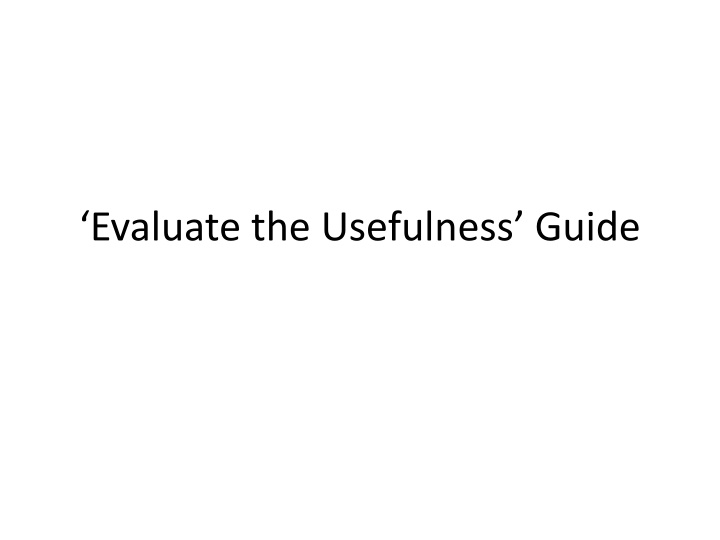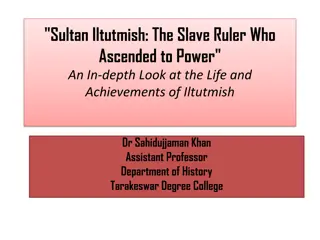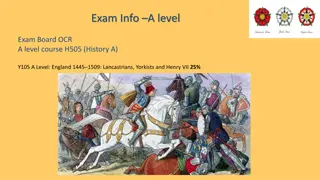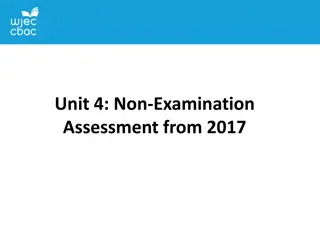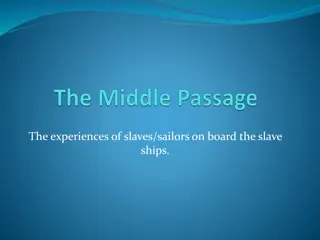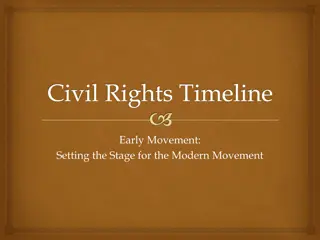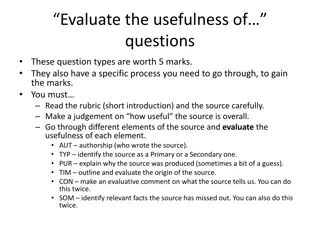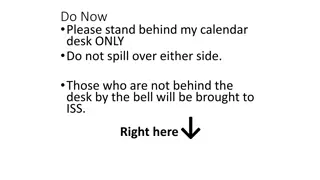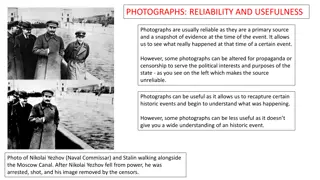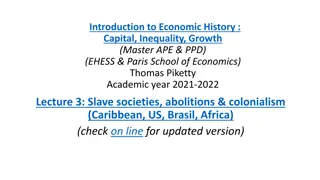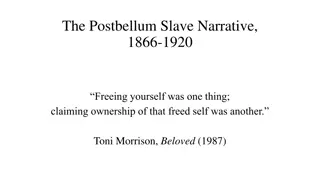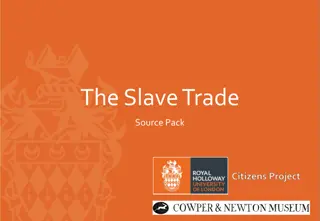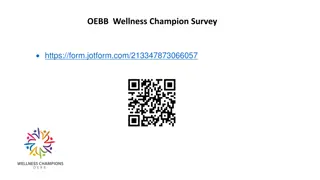Evaluating the Usefulness of a Historical Source on Slave Treatment
This guide provides assistance on how to evaluate the usefulness of a historical source regarding the treatment of slaves on the Middle Passage. It includes steps to analyze the source's credibility, relevance, and limitations in providing insights on this subject.
Download Presentation

Please find below an Image/Link to download the presentation.
The content on the website is provided AS IS for your information and personal use only. It may not be sold, licensed, or shared on other websites without obtaining consent from the author.If you encounter any issues during the download, it is possible that the publisher has removed the file from their server.
You are allowed to download the files provided on this website for personal or commercial use, subject to the condition that they are used lawfully. All files are the property of their respective owners.
The content on the website is provided AS IS for your information and personal use only. It may not be sold, licensed, or shared on other websites without obtaining consent from the author.
E N D
Presentation Transcript
Learning intention To learn how to answer Evaluate the Usefulness Questions.
Evaluate the Usefulness In these questions, you are given a source of information and are asked to explain how useful the source is to us and why it is useful to us in finding out about a particular subject. The question will be presented to you like this
Source A is from the captain of a slave ship in 1706. We must keep the slaves in shackles so they cannot escape and overpower us. They would kill us if they were able to escape. We keep them below deck and here they lay in human waste and vomit. The smell is indescribable. Twice a day they are fed a meal of horse beans or rice. Evaluate the usefulness of Source A as evidence the treatment of slaves on the Middle Passage. (5) You may want to comment on who wrote it, when they wrote it, why they wrote it, what they say or what has been missed out.
Source A is from the captain of a slave ship in 1706. Info on WHO produced the source and WHEN it was produced We must keep the slaves in shackles so they cannot escape and overpower us. They would kill us if they were able to escape. We keep them below deck and here they lay in human waste and vomit. The smell is indescribable. Twice a day they are fed a meal of horse beans or rice. Evaluate the usefulness of Source A as evidence the treatment of slaves on the Middle Passage. (5) You may want to comment on who wrote it, when they wrote it, why they wrote it, what they say or what has been missed out.
Source A is from the captain of a slave ship in 1706. Info on WHO produced the source and WHEN it was produced We must keep the slaves in shackles so they cannot escape and overpower us. They would kill us if they were able to escape. We keep them below deck and here they lay in human waste and vomit. The smell is indescribable. Twice a day they are fed a meal of horse beans or rice. Evaluate the usefulness of Source A as evidence the treatment of slaves on the Middle Passage. (5) You may want to comment on who wrote it, when they wrote it, why they wrote it, what they say or what has been missed out. Source
How to answer This question requires you to EVALUATE how useful the source is as evidence of the treatment of slaves on the middle passage. Here is a step by step guide of how to do this
Step 1 Write an overall judgement/statement saying how useful the source is. Eg Source A is partially useful as evidence of the treatment of slaves on the Middle Passage Notice how the wording of the question has been used here and that the EVALUATION of how useful the source is has been clearly written (partially useful)
Step 2 You now must explain to the reader WHY the source is partially useful. This means you must explain what makes the source useful and what makes the source less useful. You need to comment on WHO produced the source, WHEN the source was produced, the CONTENT of the source (what it tells us) and what is MISSED OUT.
Who produced this source? Source A is from the captain of a slave ship in 1706. We must keep the slaves in shackles so they cannot escape and overpower us. They would kill us if they were able to escape. We keep them below deck and here they lay in human waste and vomit. The smell is indescribable. Twice a day they are fed a meal of horse beans or rice.
Who produced this source? The source was produced by a slave ship captain Why is this useful to us?
Who produced this source? The source was produced by a slave ship captain Why is this useful to us? It is useful because the person who was written it is an eyewitness of the time.
When was this source produced? Source A is from the captain of a slave ship in 1706. We must keep the slaves in shackles so they cannot escape and overpower us. They would kill us if they were able to escape. We keep them below deck and here they lay in human waste and vomit. The smell is indescribable. Twice a day they are fed a meal of horse beans or rice.
When was this source produced? The source was produced in 1706. Why is this useful to us?
When was this source produced? The source was produced in 1706. Why is this useful to us? It is useful because it is a source from the time we are studying and no information will have been forgotten or left out.
What does the source tell us? We must keep the slaves in shackles so they cannot escape and overpower us. They would kill us if they were able to escape. We keep them below deck and here they lay in human waste and vomit. The smell is indescribable. Twice a day they are fed a meal of horse beans or rice.
What does the source tell us? We must keep the slaves in shackles so they cannot escape and overpower us. They would kill us if they were able to escape. We keep them below deck and here they lay in human waste and vomit. The smell is indescribable. Twice a day they are fed a meal of horse beans or rice.
What does the source tell us? We must keep the slaves in shackles so they cannot escape and overpower us. They would kill us if they were able to escape. We keep them below deck and here they lay in human waste and vomit. The smell is indescribable. Twice a day they are fed a meal of horse beans or rice. The content of the source is useful because it tells us that slaves were kept in shackles on board the ship. This is useful because it is accurate. The source also tells us that they were kept below deck and had to lie in their own waste and vomit, which would make disease spread easily. This is also useful as it is accurate. The source states that the slaves were fed horse beans and rice twice a day. This is a useful point of information because it is accurate.
What does the source tell us? The skill here is being able to read the source and pick out the relevant information about the question that you are being asked. This question is about the treatment of slaves during the Middle Passage We have learned that slaves were chained up below deck and had to lay in their own waste and sick. We have also learned that they were fed a poor diet of horse beans and rice. The source is useful, therefore, because it tells us these points.
What does the source not tell us? Does this source tell us everything about the treatment of slaves on the Middle Passage?
What does the source not tell us? Does this source tell us everything about the treatment of slaves on the Middle Passage? No, it doesn t. Does this make the source more or less useful?
What does the source not tell us? Does this source tell us everything about the treatment of slaves on the Middle Passage? No, it doesn t. Does this make the source more or less useful? This makes the source LESS useful, as it does not give us a full picture of what it was like for slaves on the Middle Passage.
What does the source not tell us? The source does not tell us that slaves were punished using the speculum oris, cat o nine tails and thumbscrews. It also doesn t tell us that sick slaves would be thrown overboard in an attempt to stop disease spreading through the ship. This makes the source less useful.
